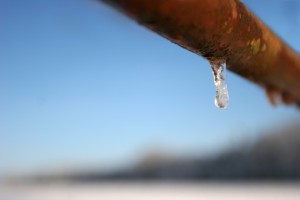 A question we often get from homeowners around this time of year is “what happens to sprinkler systems in the winter?”. The short answer is “hopefully nothing”, provided the sprinkler system was properly prepared for cold weather.
A question we often get from homeowners around this time of year is “what happens to sprinkler systems in the winter?”. The short answer is “hopefully nothing”, provided the sprinkler system was properly prepared for cold weather.
The biggest potential problem here in New England is that an improperly prepared lawn irrigation system can freeze, cracking the pipes an damaging the system in other ways. Depending on where you specifically live, a harsh winter with extended periods of time below freezing can cause the ground to freeze at or below the level of the sprinkler system pipes. If the system is not drained in the Fall, any water remaining in the lines can freeze. Water, of course, expands when it freezes, which can put a strain on the pipes and cause them to crack. In a worst case scenario, a hard freeze can even cause fittings to burst, sprinkler and pump cases to split open, and valves to crack.
To avoid potentially expensive repairs, it’s important to turn off the water supply and drain your sprinkler system, which can be done with either manual or automatic drain valves that use gravity to empty water out of the system. While some homeowners might do this themselves to save a little money, if the lines were not correctly installed with a grade enabling drainage, or if the lines have a moved over time as the ground shifts and settles from freeze/thaw cycles, water can collect in low sections and freeze.
The most effective way to drain your sprinkler system is to blow the water out completely using compressed air. In fact, if your system has electric valves, the only way to drain it is by blowing it out, otherwise water will remain on top of the valve diaphragm.
While it’s certainly possible for homeowners to buy a compressor and do the job themselves, getting the air volume and pressure right can be tricky. If there’s not enough air volume flowing through the lines, some of the water will be blown out, but some may remain in the lines where the pressurized air will simply flow over it.
If your sprinkler system is attached to your domestic water supply, it has a backflow device on it to prevent water in the system from backing up into your home. This, too, must be purged to avoid freezing. However, there are three types of backflow devices: an atmospheric vacuum breaker (AVB), a pressure vacuum breaker (PVB) and a reduced pressure (RP) device. AVBs can be drained using compressed air, but PVBs and RPs must never be blown out because the heat of the air can easily melt the rubber seals on them.
The importance of draining a sprinkler system and properly preparing it for winter cannot be stressed enough. A knowledgeable homeowner with the right equipment can do it themselves, but most homeowners are not trained or equipped to do it safely and properly. Paying a skilled and experienced professional is a wise investment when the alternative may involve lengthy and costly repair work.







